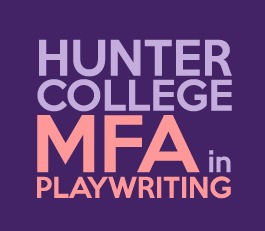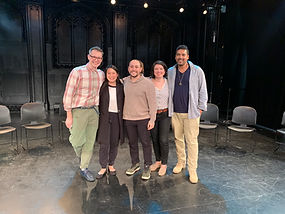
The Rita and Burton Goldberg MFA Playwriting Program at Hunter College is a highly selective, rigorous, and affordable two-year playwriting program located in the heart of New York City. We seek writers eager to develop their craft and challenge assumptions about what theatre is and will become.
The Program
The program at Hunter is focused on helping writers hone their voice and aesthetic while taking risks and experimenting with form. Students study with award-winning writers, working theatre professionals, and esteemed guest artists in a program that offers intensive, hands-on writing workshops and fosters a collaborative, close-knit artistic community.
There are five students in each cohort, which allows our instructors to give students generous individual attention. Each semester, students take three courses that meet in the evenings, which enables students the flexibility to work during the day. Teaching Assistantships are available to students in their second year. To supplement coursework, the program provides a series of Master Class workshops each semester with playwrights, directors, and industry professionals, as well as free or affordable tickets to a wide range of New York City productions to facilitate a robust connection with the New York theatre community.
The capstone project of the program is the Hunter MFA Playwrights Festival, a week-long workshop with professional directors and actors which culminates in a public reading attended by agents, literary managers, producers, and other industry professionals. You can read about our 2022 MFA Playwrights Festival HERE.
The Hunter MFA Playwriting program is both affordable and accessible. The cost of in-state tuition for one semester is $4,230, and the program is often able to provide partial or full tuition waivers to incoming students. Additionally, all students are offered paid Teaching Assistantships in their second year.
Instructors
Current and Recent Playwriting Faculty include:
David Adjmi (Stunning, Marie Antoinette)
Clare Barron (Dance Nation, You Got Older)
Mia Chung (Catch as Catch Can, You For Me For You)
Lisa D’Amour (Detroit, Airline Highway)
Tina Satter (This is a Room, Half Straddle)
Lloyd Suh (The Chinese Lady, American Hwangap)
Maria Striar (Clubbed Thumb)
Anne Washburn (Mr. Burns, a Post-Electric Play, The Internationalist)
Visiting Artists
2021-2022 Visiting Artists:
Sharon Bridgforth, Sheila Callaghan, Lisa D’Amour, Daniel Alexander Jones, and Lauren Yee
Photos from the 2022 MFA Playwrights Festival

Student & Alumni News
September 7, 2022
July 31, 2022
July 13, 2022
June 16, 2022
Diana Ly (’23) announced as a debut member of the Universal Writers Lab.
May 20, 2022
May 17, 2022
April 4, 2022
March 16, 2022
Lindsey Ferrentino (‘14) will write and direct film version of Amy and the Orphans for Netflix.
March 1, 2022
John Caswell Jr.’s (’20) Man Cave produced by Page 73 premieres at the Connelly Theatre.
February 9, 2022
January 31, 2022
Liqing Xu’s (‘21) Yellow Dream$ produced in Second Stage’s 2022 Judith Champion New Voices Series.
January 18, 2022
September 23, 2021
Justice Hehir (’18) and Hannah Novak (’18) receive Clubbed Thumb Constitution Commissions.
September 15, 2021
May 22, 2021
January 11, 2021
Diana Ly (‘23) was selected for the Sống Collective’s Inaugural Việt Writers Lab.
September 24, 2020
John J. Caswell Jr. (‘20) received the Vineyard Theatre’s 2020 Paula Vogel Playwriting Award.
February 6, 2020
Admission Requirements
You must meet the following minimum requirements in order to be considered for admission. Meeting these minimum requirements does not guarantee acceptance to the program.
Interviews will be conducted with a select group of candidates after the initial review of application is completed. (Only matriculated students are eligible to take MFA courses.)
-
A bachelor’s degree from a regionally accredited institution comparable in standard and content to a bachelor’s degree from Hunter College.
-
Play Manuscript - Submit a full length play at least 45 pages as a PDF. A digital copy of the manuscript needs to be uploaded in the online applications system before submitting the application
-
Two letters of recommendation from appropriate academic or professional references.
-
A statement of purpose of approximately 500-750 words answering the following questions: Why do you choose playwriting as a literary form? Discuss your background in the theatre, the playwrights and productions that have influenced you, and what you hope to bring to the stage.
Applicants whose native language is not English and who have taken all or part of their undergraduate education in a country where English is not the native language are required to submit scores on the Test of English as a Foreign Language (TOEFL). The following minimum scores must be obtained:
-
Paper Based Test: 550
-
Computer Administered Test: 213
-
Internet Based Test: 60 (less speaking component)
FALL 2023 DEADLINE: January 15, 2023
Questions? Contact the Director of the Rita & Burton Goldberg MFA Playwriting Program, Christine Scarfuto, at [email protected].
Ready to start your application? Click the button below!
Degree Requirements
This two-year program encourages playwrights to discover and develop their unique voices. Students should expect a thorough grounding in theatre history, dramatic literature and theory, and the craft of playwriting. They will also have the opportunity to take electives and learn from well-known guest artists. At the end of the first year, students will have a reading with a professional director and actors. The second year of the program culminates in a 29-hour workshop of a new play and a public, staged presentation of the students’ work.
Required Courses
-
MFA Playwriting I: Developing Your Voice
THC 73100 -
MFA Playwriting II: The Art of Revision
THC 73200 -
MFA Playwriting III: New Play Workshop
THC 73300 -
MFA Playwriting IV: Thesis Project
THC 73400 -
MFA Production Workshop I: Adaptation
THC 73500 -
MFA Production Workshop II: The Playwright Prepares
THC 73600 -
History of Theatre I
THC 75100 -
History of Theatre II
THC 75200 -
Play Analysis
THC 79000 -
Electives (9 credits)
Sample Program of Study
First Semester
-
History of Theatre I
-
MFA Playwriting I: Developing Your Voice
-
MFA Production Workshop I: Adaptation
Second Semester
-
History of Theatre II
-
MFA Playwriting II: The Art of Revision
-
Elective
Third Semester
-
MFA Playwriting III: New Play Workshop
-
Play Analysis
-
Elective
Fourth Semester
-
MFA Production Workshop II: The Playwright Prepares
-
MFA Playwriting IV: Thesis Project
-
Elective
FALL 2022 COURSES
MFA IN PLAYWRITING
Click here to see class descriptions.
Leadership
The Director of the Rita and Burton Goldberg MFA in Playwriting is Christine Scarfuto. Christine is a dramaturg with over a decade of experience in new play development. She was the Literary Manager of Long Wharf Theatre from 2015-2019 and has worked with Second Stage Theater, LCT3, Signature Theatre, Lark Play Development Center, Playwrights Center, Clubbed Thumb, Playwrights Realm, Hudson Valley Shakespeare Festival, Williamstown Theatre Festival, and the Kennedy Center. Christine was educated entirely in public schools including the University of Iowa, where she received her MFA in Dramaturgy.
The Program is part of the Hunter Department of Theatre, which is chaired by Tony Award-winning producer and director Gregory Mosher, who has produced over 100 world or American premieres at the Lincoln Center and Goodman Theaters, on Broadway, and in the West End. Writer colleagues in these productions include David Mamet, John Guare, Elaine May, Emily Mann, John Leguizamo, Richard Nelson, Mbongeni Ngema (Sarafina), Arthur Miller, David Hare, the Nobel Prize-winners Derek Walcott and Wole Soyinka, Tennessee Williams, Samuel Beckett, and many more.
Learning Outcomes
Graduates of our MFA Playwriting Program will be able to:
-
Create, revise, and develop full-length dramatic works that expresses students’ own artistic aesthetic.
-
Collaborate with directors, designers, actors, and other theater artists.
-
Develop constructive workshop practices and demonstrate the ability to closely observe, analyze, and respond constructively to the writing of workshop participants.
-
Analyze a variety of dramatic structures, techniques, methods, and approaches with the aim of enriching students’ own work.
-
Demonstrate a sophisticated knowledge of theater history and practice with the aim of enriching students’ own work.

